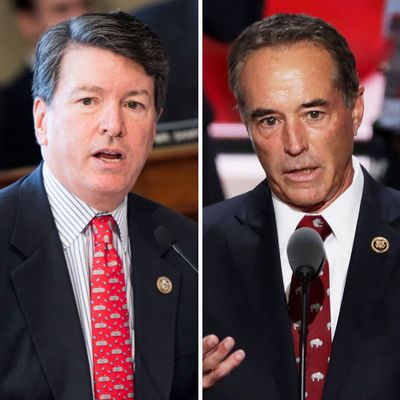
Back in March, when Republicans were making their first frenzied effort to get the American Health Care Act over the line in the House, a “manager’s amendment” appeared to accommodate the demands of several GOP factions. One of the most eyebrow-raising, which some called the “Buffalo Bribe” (a reference to the hometown of one of the provision’s authors, Representative Chris Collins), involved language forcing New York State to pick up Medicaid costs currently borne by counties. The provision, which showed its partisan nature by exempting New York City from the local government bonanza, shifted $2.3 billion a year from county to state taxpayers, enraging Governor Andrew Cuomo but helping nail down six New York Republican House votes for AHCA.
The “Buffalo Bribe” was the sort of thing you might expect to be dropped from the Senate version of AHCA, given all the talk about the upper chamber refusing to rubber-stamp the House bill and “starting over” with its own policies and priorities. After all, it’s not like New York senators Chuck Schumer and Kirsten Gillibrand were going to fight for the provision, or support the overall bill. But lo and behold, when the Senate “discussion draft” was finally unveiled, there it was.
The provision, authored by GOP Congressmen John Faso of Kinderhook and Chris Collins of western New York, is a carryover form the House’s American Health Care Act.
The bill language was not amended by the Senate. It gives the state the same ultimatum the House gave: Either the state picks up the county share of costs, or it will lose federal funding worth the same amount.
There are two lessons to be learned from the survival of the “Buffalo Bribe” this far into the legislative process. The first is that Mitch McConnell isn’t just trying to get a bill through the Senate; he wants the Senate bill to be close enough to the House bill that a House-Senate conference will not be that difficult — or indeed, can be avoided altogether by the House simply adopting the Senate bill, which would lop weeks if not months off the time needed to get a bill onto Donald Trump’s desk. That means honoring the deals cut by the House leadership.
But there’s a second lesson that could prove to be more problematic for McConnell. It will encourage fence-sitting senators to cut similarly crass deals. When the “Buffalo Bribe” was first announced I called it a “dinner bell” for senators who wanted to shake down their colleagues in exchange for badly needed votes. With this language now being in the Senate bill from the get-go, the dinner bell is now ringing loudly. I am sure it is being heard very well by, say, Lisa Murkowski of Alaska, whose state has especially expensive and complicated needs associated with its enormous rural areas and unusual demographics. Her vote is going to cost an awful lot. But it’s not like McConnell can now say “We don’t cut those sorts of deals.” He already has.






























